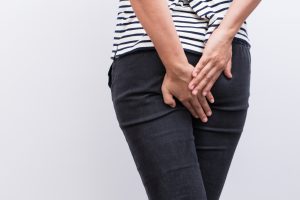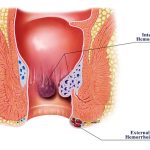 Although you may be embarrassed to talk about anal leakage, it is a serious problem that should be discussed. Anal leakage, also known as fecal incontinence, is when feces or stool are expelled from the body without purpose and can even occur suddenly without warning.
Although you may be embarrassed to talk about anal leakage, it is a serious problem that should be discussed. Anal leakage, also known as fecal incontinence, is when feces or stool are expelled from the body without purpose and can even occur suddenly without warning.
Normally, when we feel the urge to pass a bowel movement, we go to the toilet and release stool. When we cannot control this, accidents take place where the feces end up coming out before we reach the toilet.
Advertisement
There are many reasons for anal leakage. In some cases, it’s a temporary occurrence, while in others it may be caused by a chronic condition. It’s important that you speak to your doctor about your anal leakage to determine the underlying cause and get appropriate treatment.
To understand anal leakage, it’s important to understand how the anus works. There are two sphincters that allow us to control our bowel movements. In cases where we cannot control our bowel movements for whatever reason, stool is then released soiling our garments.
Anal leakage: Prevalence
One study found that 19 percent of surveyed women reported an episode of anal leakage. This number is much higher than what has been previously reported. Anal leakage can affect men and women, particularly women after childbirth.
Causes of anal leakage
 Anal leakage can occur as a result of a dysfunction of the nerves and/or muscles of the anal sphincters, increased pressure in the colon, or inflammation impairing the function of the anus. Anal leakage causes can vary in severity. If left untreated, fecal incontinence can lead to social isolation, embarrassment, and in some cases turn into a life-threatening condition.
Anal leakage can occur as a result of a dysfunction of the nerves and/or muscles of the anal sphincters, increased pressure in the colon, or inflammation impairing the function of the anus. Anal leakage causes can vary in severity. If left untreated, fecal incontinence can lead to social isolation, embarrassment, and in some cases turn into a life-threatening condition.
Anal leakage isn’t just the leakage of feces. Fluid, mucus, and blood can leak from the anus, too. Causes of anal leakage include:
Diarrhea: Often caused by bacteria or an infection such as norovirus, gastroenteritis, food poisoning, and other infections in the digestive system.
Constipation: You may not think that constipation can contribute to anal leakage, but it does. Even though it is not being passed, impacted stool causes the colon and rectum to become weak and stretch, so fluid around the stool can leak out.
Muscle problems: The anal sphincters are made up of many different muscles that contract and relax to allow stool to pass. If these muscles are sick or unable to contract fully, stool can leak out. Muscle weakness can be caused by hemorrhoids, childbirth, certain muscular disease, and some surgeries.
Nerve problems: The anal sphincters are controlled by nerves that instruct the muscles on how to function. Damaged or diseased nerves cannot instruct the muscles to function properly, so anal leakage occurs. Types of nerve damage include diabetic neuropathy, spinal cord injury, stroke, and multiple sclerosis. Nerve damage can also be a result of straining when pushing out bowels and during childbirth.
Rectal stiffening: If the rectum becomes diseased, then its ability to stretch and hold stool becomes impaired. Scar tissue forms as a result, causing the rectum walls to become stiffer. The rectum then can no longer support larger stools, so fluid and wet feces to leak out as a result. Rectal stiffening can be caused by rectal surgery, inflammatory bowel disease, and radiation damage.
Rectal prolapse: If the rectum can no longer be well supported by surrounding muscles it can protrude through the anus. In rectal prolapse, fluid can leak out through the protruding rectum.
Anal cancer: Anal cancer damages the nerves and muscles of the anus, impairing the function of the anal sphincter. Blood may be present in the leakage. Anal cancer is a life-threatening condition.
Causes of anal leakage of feces, fluid, and mucus include:
- Severe gastroenteritis
- Chronic constipation, particularly where there is fecal impaction
- Severe hemorrhoids
- Bowel conditions like inflammatory bowel disease (IBD) and severe irritable bowel syndrome (IBS)
- Anatomical anomalies of the rectum and anus since birth (congenital anorectal anomalies)
- Gynecological injuries during childbirth or after a hysterectomy
- Nerve disorders like diabetic neuropathy, spinal cord injury, stroke, postoperative nerve injury to the anus, dementia, and multiple sclerosis
- Anal fissures
- Celiac disease
- Colorectal cancer or anal cancer
- Diverticulitis
- Fecal impaction
- Food intolerance like lactose intolerance
- Gastroenteritis
- Hemorrhoids
- Inflammatory bowel disease
- Irritable bowel syndrome
- Proctitis
- Rectal ulcers
Signs and symptoms of anal leakage
Other signs and symptoms one may experience depend on the particular cause of anal leakage. Along anal leakage you may also experience an itchy anus, itchy buttocks, burning anus, anal pain, the urge to pass stool even after passing a bowel movement, and altered bowel movements such as diarrhea or constipation.
Anal leakage treatment options
 Treatment of anal leakage depends on the underlying cause. Topical applications, oral medications, or surgery are all viable treatment options for anal leakage.
Treatment of anal leakage depends on the underlying cause. Topical applications, oral medications, or surgery are all viable treatment options for anal leakage.
Some treatment methods for anal leakage include:
- Fecal incontinence: Antidiarrheal drugs, laxatives, enemas for fecal impaction, diet, and exercises
- Hemorrhoids: Hydrocortisone ointments and other applications, oral pain relievers, sitz bath, and lifestyle changes
- Gastroenteritis: Supportive measures like bed rest and rehydration until the diarrhea resolves, antidiarrheal medication, antibiotics
- Constipation: Fiber supplements, stool softeners and other laxatives, dietary changes, and exercise
- Inflammatory bowel disease: Anti-inflammatory drugs, immune system suppressants, antidiarrheal medication, antibiotics, pain relievers
- Irritable bowel syndrome: Antidiarrheals or laxatives, antispasmodic medication, drugs to slow down bowel motility, antibiotics, antidepressants, fiber supplements, dietary and lifestyle changes
Advertisement
There are various medications available for anal leakage due to nerve or muscle damage. Your doctor will be able to recommend the most suitable option for your particular case.
The longer anal leakage is left untreated, the higher the risk of complications. Speak to your doctor about this problem to obtain treatment.
Related:
- Perianal hematoma: Causes, symptoms, and treatment of perianal thrombosis
- What causes overactive bowel? Symptoms, tests, and treatment
